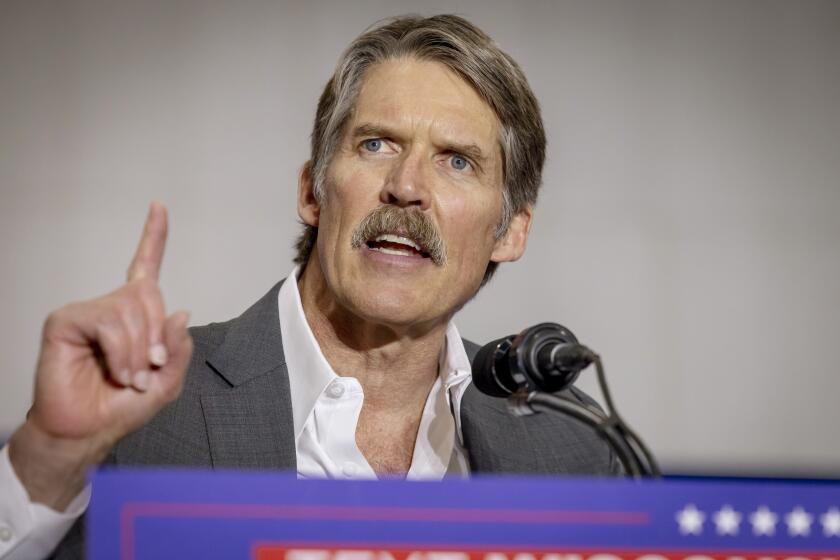Engineering a New Approach on Energy, Commerce Policies
Broadcast indecency soared to the top of the congressional agenda after Janet Jackson’s breast-baring performance at the Super Bowl. And as luck would have it, Rep. Joe Barton (R-Texas), the new chairman of the House committee that oversees the nation’s airwaves, was at the game.
But he never saw Janet Jackson. He was busy pleading with Senate Majority Leader Bill Frist (R-Tenn.) to get the Senate to pass the long-stalled energy bill, which Barton helped write.
“That sounds like Joe Barton,” said former House Majority Leader Dick Armey (R-Texas). “Joe’s an engineer, and he’s got an engineer’s personality.”
Now that engineer, as head of the House Energy and Commerce Committee, is going to be substantially responsible for overseeing and shaping legislation relating not only to the use of public airwaves but also the telecommunications industry, consumer protection, food and drug safety, air quality and energy policy.
He’s an unpredictable quantity, although his record is not silent. He usually -- but not blindly -- favors less government regulation and more reliance on free markets.
Whatever Barton is, he is no W.J. “Billy” Tauzin. The Louisiana Republican who chaired the House committee until early this year was conspicuous for hobnobbing with Hollywood studio chiefs and rushing to call headline-grabbing hearings.
Tauzin spent an earlier Super Bowl in the company of Disney’s Michael Eisner. Barton couldn’t recall if he had ever met the controversial chief executive. “I’m not a Hollywood-type guy,” he said.
Barton, who has made his mark as chairman of the Energy and Air Quality subcommittee, may now have to go Hollywood, at least to a degree. Tauzin unexpectedly resigned as chairman after he was offered a lucrative job with a pharmaceutical industry group that benefited from the Medicare drug bill the committee helped write. He has since broken off talks with the group.
The full Energy and Commerce Committee is often a battleground for legislation affecting Hollywood and Silicon Valley -- whose interests regularly collide. Billions of dollars ride on its decisions, which can hugely affect competition and consumer prices.
Under Tauzin, the panel pursued high-profile investigations, including hearings on Enron Corp.’s meltdown and the 2000 Firestone tire recall that involved hundreds of rollover accidents with Ford Explorers.
Barton’s approach may be different. Just before taking the gavel at his first meeting, he stood at the table where witnesses sit, where some take the 5th Amendment.
“I had never been down there looking up,” he said. It gave him new appreciation for the committee’s responsibilities.
He indicated that a number of heads of federal agencies soon could find themselves sitting before Barton undergoing a grilling on ways they might save money. Barton said one of his priorities would be to look for ways to reduce the federal budget deficit.
“A showboat he is not,” said Rep. Anna G. Eshoo (D-Atherton), who serves on Barton’s committee. Rep. Mary Bono (R-Palm Springs), another committee member, called Barton a “workhorse.... He’s happy staying in the background.”
A conservative ally of House Majority Leader Tom DeLay, a fellow Texan, Barton has championed deregulation of energy markets, even after losing about $10,000 when the value of his Enron stock plummeted after the company went bankrupt.
Barton, 54, is a 20-year Capitol Hill veteran who has shown streaks of independence. As co-chair with Massachusetts Democrat Edward J. Markey of the congressional Privacy Caucus, Barton defied Republican leaders to push for tougher consumer privacy measures than banks favored as part of a financial services overhaul. He has advocated random drug testing for members of Congress and, although his colleagues have rejected the idea, voluntarily undergoes testing himself.
He is known for digging in his heels. “He’s the poster child for the person who does not take no for an answer,” Rep. Rick Boucher (D-Va.) said admiringly.
He doesn’t expect to get many no votes on the first major bill he takes to the House floor as committee chairman. The Broadcast Decency Enforcement Act, which cleared the committee last week on a 49-1 vote, would increase the fine for entertainers as well as broadcasters for violations of federal decency rules to a maximum of $500,000 each and require a revocation hearing for a broadcaster’s license after the third offense.
“We’re mad as h-e-l-l,” Barton said during a recent hearing, spelling it out, “and we’re not going to take it anymore.” An aide said Barton didn’t want to swear into the public record at a hearing on indecency.
Barton said his No. 1 priority was delivering on the first overhaul of national energy policy in a decade.
He is the main author of a sweeping bill that he says contains conservation measures and is needed to reduce U.S. dependence on foreign oil and prevent fuel price spikes. Critics say the bill is tilted too heavily toward increased production.
The bill has run into opposition in the Senate, largely because of a provision insisted upon by Barton and DeLay. It would limit the liability of manufacturers of MTBE, a gasoline additive produced in Texas that makes a car’s engine burn cleaner but that has been blamed for polluting groundwater in a number of states. California has banned the additive.
“We’re not going to do anything in the House that gives trial lawyers a blank check to go after the MTBE manufacturers,” Barton said.
Barton, who enjoys playing Texas Hold’em poker, signaled he was ready for some political hardball. “Sooner or later,” he said, “some of these senators who voted no [on the energy bill] are going to need something from Chairman Barton,” he said.
The Center for Responsive Politics calls Barton “the energy industry’s favorite son” because he has received $1.6 million from the energy sector since 1989, more than any other House member. “I take that as a compliment, I suppose,” he said, citing his roots from energy-producing Texas.
Barton, whose ancestors settled in Texas during the 1840s, was born in Waco. He received a bachelor’s degree in industrial engineering from Texas A & M and a master’s in industrial administration from Purdue. After working for Ennis Business Forms, a manufacturer of business products, he served as a White House fellow, then worked as a consultant for Atlantic Richfield Oil and Gas Co.
In 1984, he was elected to the House along with Armey, DeLay and three other Republicans known as the “Texas Six-Pack.” In the late 1980s, he led a campaign to get a multibillion-dollar atom smasher built in his district, but the project was killed by Congress in 1993 because of concerns about the federal budget deficit.
In 1990, he was the only member of the Energy and Commerce Committee to vote against granting junk-bond financier Michael Milken and stock speculator Ivan F. Boesky immunity from additional prosecution in order to persuade them to testify before Congress. His aide at the time said Barton did not “believe in giving immunity to convicted felons.”
In 1993, he ran for a vacant Senate seat but lost in the primary to Kay Bailey Hutchison, who won and still holds the seat. As a member of Congress, he has championed a constitutional amendment that would require a balanced federal budget but allow taxes to be raised only if two-thirds of both the Senate and the House concurred.
“I have the same value system I had 20 years ago,” Barton said in an interview. “I still come to Texas every weekend. I still live in the same house. I still go to the same church.
“I’m a conservative. My voting record is not going to change because I’m chairman of the committee.”
More to Read
Get the L.A. Times Politics newsletter
Deeply reported insights into legislation, politics and policy from Sacramento, Washington and beyond. In your inbox three times per week.
You may occasionally receive promotional content from the Los Angeles Times.






